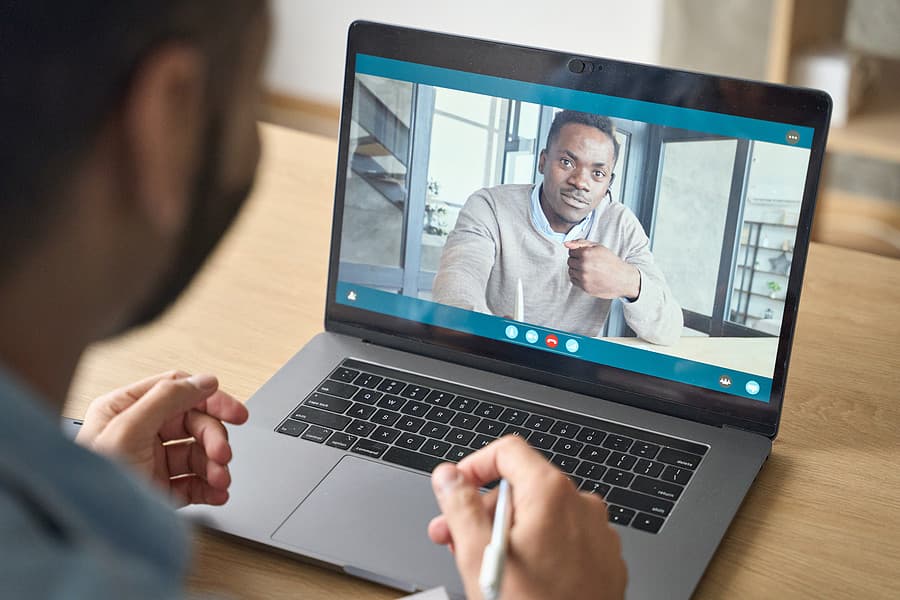Virtual job interviews became standard practice in recent times out of necessity. But now that companies have been accustomed to the technology, virtual interviews are likely to remain as a standard part of many organizations’ recruitment practices. It’s therefore important for recruiting departments to ensure that they are considering key matters regarding such interviews. Here are are the main issues to keep in mind:
Recordings
Recording a job interview — by video, audio, screen-shot, or otherwise — raises a host of potential issues, both legal and non-legal. First, in many states, recording the audio of an interview is unlawful unless both parties to the conversation consent to the recording.
Still, putting aside the issue of potential liability, there are many reasons to avoid recording interviews. The prospect of having every word and gesture recorded may stifle the dialogue. Moreover, if applicants record job interviews, they have the power to share the recording with other applicants or even post it on social media, compromising the employer’s recruitment efforts.
If a candidate asks to record the interview, you have the right to say no (although an individual may still record the interview in states with one-party consent rules). Your best approach is likely to address the issue proactively, such as via a set of written interview protocols communicated to applicants when the interview is scheduled. By putting applicants on notice that they may (or should) not record the interview (and perhaps that you won’t either), your company can set the tone for a free-flowing exchange during the interview.
Security
An interview that takes place over virtual channels raises security concerns. If a participant in the interview uses an unsecured network, such as public WiFi, there is a real risk that malicious actors could gain access to data discussed or displayed during the interview. Instructing applicants in advance to use a secure WiFi connection helps to mitigate the security risks and allows candidates to plan where and how they will connect.
Likewise, you should take measures to prevent uninvited third parties from accessing the interview. Consider setting up a passcode so that only authorized persons can access the interview, as well as turning on settings so that you can hear when someone enters and exits the meeting.
Technology
Glitches in the technology used to conduct a virtual job interview may waste valuable interview time, disrupt the flow of conversation and create an unflattering impression. Practice using software with help from your colleagues in IT to help ensure the interview goes smoothly. Likewise, advise applicants to test the settings on their device to ensure adequate sound and audio quality before the interview.
If you plan to share documents on your screen, be sure to test the function in advance to avoid wasting time during the interview or inadvertently sharing something that was not meant for the applicant’s eyes. Likewise, practice how to turn off your audio or video (this may seem obvious, but…Jeffrey Toobin). By testing the software in advance, and having a back-up plan if it fails, you can minimize the risk that a glitch will throw off the interview.
Yet if a problem arises during the interview, handle it with grace. For example, if there is a delay in audio transmission, acknowledge the issue in the moment and offer a workaround, such as consciously waiting a few seconds after the other person speaks to respond. The way you deal with a glitch can signal to the applicant what it may be like to work at your company, so keep a positive attitude despite the interruption.
Privacy
When a job interview takes place in the employer’s office, it is obvious who is present in the room and who is not. With virtual interviews, employers lose visibility into the applicant’s interview setting. The presence of another person, whether visible or not, has the potential to distract the candidate and the interviewer and compromise the integrity of the process.
For example, it is not difficult to imagine an applicant, eager to get a job offer, to ask a trusted friend or family member to listen in on the conversation for moral support.
You may want to advise individuals beforehand, via interview protocols communicated in writing, that they will need to be alone for the interview. This instruction gets applicants thinking about where they will be for the interview and sends a subtle message not to have anyone else join off camera. If a curious child or other person accidentally enters the applicant’s room or your own interview space, pick up the conversation after the person has left, without dwelling on the interruption or pretending that it didn’t happen.
Virtual job interviews will be new territory for many job applicants, but you can maximize the success of the experience by anticipating issues that may arise. By thinking through the what-ifs beforehand, you can make it possible for hiring managers and applicants to focus their valuable interview time on finding a match for the role.
